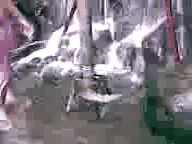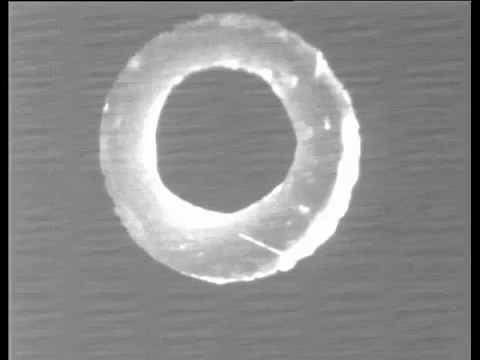My Galaxy Model (Originally the best one out today)
Actual Spider Galaxies are the perfect testable observational model.
The Kapitza Spider
Helium II thermal counterflow jet chamber
Segner's wheel uses only normal fluid components, but does pretty well at producing the Kapitza spider effects.
Segner wheel with water steam jets instead of a plasma galaxy with superfluid jets
Superfluid counterflow behavior in low viscosity milk, evident in a galaxy jet.
Jet Powered Spinning Warming Superfluid Helium A.K.A. "Black Hole" With Spiral Arm Filaments :
(1) Galaxy jets have already been proven to be electromagnetic or MHD driven without gravity.
(2) There are no picky eating black holes. Proven cold inflows to galaxy centers with hot gas outflows.
(3) Superfluid helium and theoretical postulated mathematically unstable inferred black holes, both have nearly the same proven temperature near absolute zero. Which idea is more believable?
Magnetized plasma ring rotation
Spin rates of galaxy centers are quantized in discrete increments, causing all stars in almost every galaxy to have a constant orbital velocity around the center. This is the dark matter galaxy rotation speed paradigm requiring different percentages of dark matter for all galaxies. Superfluid galaxy centers all have quantized spin velocity, with spiral arm filaments having two components: (1) The normal matter component like gas and dust. (2) The counterflow or reverse direction superflow component in a countervortice state, connecting all stars to the galaxy center, and making each star orbit at the same speed or constant velocity. Faster spinning galaxies have faster star formation rates.
Quantized spin velocity of superfluids explains the galaxy rotation curveMagnetized plasma ring rotation
Superfluid earth labs have discovered everything real that a phony black hole is supposed to be doing:
(1) Superfluids absorb, trap, capture, or slow light speed way down in what is called a "Bose Einstein Condensate" which is a misnomer term used exclusively in relativity, instead of applying observable Beltramic field structures for a superfluid cosmology.
(2) Superfluids form an insulating double layered "concealing accretion disk" where originate bipolar jets that carry electric currents and form Birkeland currents that shape the spinning galaxy.
(3) Superfluid helium forms spiral arm Kapitza filaments where stars form inside.
(4) Spinning superfluids carry the angular momentum in quantized vortices that carry electric currents that produce associated cosmic scale magnetic fields and vice versa.
Critics:
Only those who believe in the hearsay dogma of black holes, dark matter, dark energy, and the big-bang gravity singularity creation theory, who suggest themselves that their black holes may have already existed before the big-bang.
Spinning superfluid helium collectively shapes a pancake shaped galaxy
VORTEX RING IN A SUPERFLUID
Magnetic levitation with superconductor disk
Birkeland current
Stars forming like beads on strings without gravity in a filament knot inside an evaporating gaseous globule
Superfluid helium counterflow animation shows a friction free zero viscosity superflow in the opposite direction of normal gaseous dusty matter. The two fluid model with MHD countervortices explains observations of superfluid vortices surrounding supernovas, and all vortex structures in galaxies.
Superfluid helium forming ring shaped knots
Abel supernova with superfluid counterflow countetvortex ring that expands to form new stars
Computer program shows stars forming inside filaments like beads on strings. Only 5,000 hydrogen atoms per cubic centimeter is supposedly sufficient for gravity theory who the authors collaborate with.
Spidery cosmic web of Kapitza filaments
Quantized spin like appearing behavior in a magnetoflipper I wish I could buy
Orthovortex countervortices in MHD have all four vector fields perfectly aligned.




























No comments:
Post a Comment